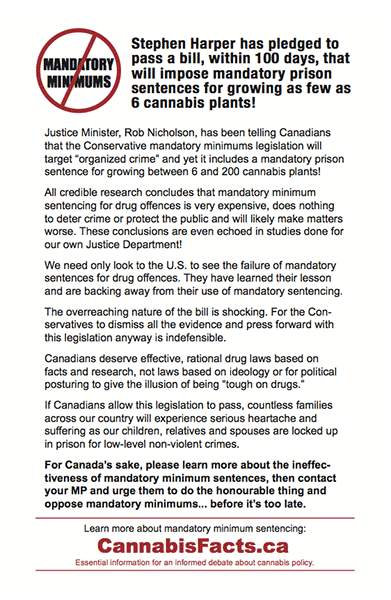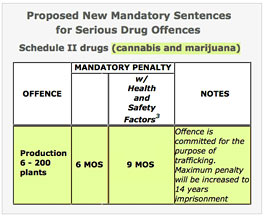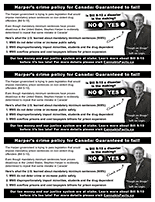
| Essential information for an informed debate about cannabis policy. |
Mandatory Minimum Sentences for Drug Offences
Previous legislation: "Bill S-10 - Penalties for organized drug crime act"
Mandatory Minimum Sentencing in the News • June 17, 2011: States cut drug penalties as Canada toughens them After more than 20 years of the war on drugs, more than a dozen U.S. states are reducing penalties for many drug offences. The move away from mandatory minimum sentences without any chance of parole comes as states struggle to cover the costs of overcrowded prisons in the midst of tough economic times. Republicans and Democrats alike have also recognized weaknesses in their tough-on-crime, one-size-fits-all sentences. That's different from Canada, where the Conservative government has started toughening sentencing and imposing mandatory minimums for a number of crimes. • June 16, 2011: Call Off the Global Drug War By JIMMY CARTER Some of this increase has been caused by mandatory minimum sentencing and “three strikes you’re out” laws. But about three-quarters of new admissions to state prisons are for nonviolent crimes. And the single greatest cause of prison population growth has been the war on drugs, with the number of people incarcerated for nonviolent drug offenses increasing more than twelvefold since 1980. Not only has this excessive punishment destroyed the lives of millions of young people and their families (disproportionately minorities), but it is wreaking havoc on state and local budgets. Former California Gov. Arnold Schwarzenegger pointed out that, in 1980, 10 percent of his state’s budget went to higher education and 3 percent to prisons; in 2010, almost 11 percent went to prisons and only 7.5 percent to higher education. • June 13, 2011: Mandatory Minimum Terms for Cannabis Cultivation: How Crazy are the Harper Conservatives? There is a very real sense in which we - or at least the Tories - are operating without a shred of science on our side. Why are they doing this? The costs of jailing marijuana cultivators will soar into the billions of dollars within a few years - and it will be the provinces, not the federal government, that will have to pay for the construction and operation of these new provincial facilities. Why have the provinces been so silent? Are they looking to create prison industries in rural areas of their jurisdictions, shoring up longstanding unemployment, and potentially converting these voters to their cause? Do they not care about the costs and the consequences of putting thousands of non-violent offenders in jail? Could this money not be better spent on health care, or other more useful collective endeavours? • June 2, 2011: Canada’s utterly failed drug policy [National Post editorial board] • June 2, 2011: War on drugs ‘a failure,’ international panel declares A high-powered panel of former heads of states and United Nations officials says it is time for governments to find new ways to deal with the world’s drug problem • May 21, 2011: Crime and punishment: Inside the Tories’ plan to overhaul the justice system Among the more controversial aspects of the bundle is mandatory minimum sentences. Minimum sentences are hardly new to the Criminal Code, and they are hardly partisan — the previous Liberal government imposed mandatory minimums on several child-exploitation offences. But the Conservative omnibus bill will dramatically expand them, limiting judicial discretion to levels unseen before. • May 14, 2011: Drug prohibition is dumb on crime Here in Canada, this thinking is the basis for proposed federal mandatory minimum sentencing legislation. Unfortunately, like archaic cultures that clung to the belief that the Earth was flat, those who support mandatory minimum sentences for drug crimes are willfully ignorant of the near universal consensus that mandatory minimum sentences are both extremely costly and ineffective. • May 13, 2011: MP Blake Richards obediently champions Conservative "100 days" Omnibus crime bill Canadians have waited long enough for these measures. We promised during the election that a majority Conservative government would bundle and pass into law our outstanding and delayed justice bills within Parliament’s first 100 days and that is just what we intend to do.
This comprehensive legislation will include new measures that will: crack down on organized drug crime; <snip> MP Richards also uses his column to spread misinformation about opposition parties stalling Conservative crime bills in the past Many of our government’s bills faced co-ordinated obstruction by opposition parties who are apologists for criminals. • April 7, 2011: Conservative majority would hustle crime bills into law all at once Stephen Harper is promising a majority Conservative government would bundle all the law-and-order legislation it’s been trying pass into one omnibus bill and pass it within 100 days of taking power.
This omnibus bill would include Bill S-10, misleadingly referred to in the article as a legislation to, "Crack down on organized drug crime."
CONTEMPT OF PARLIAMENT |
| Bill S-10: Mandatory Minimum Misinformation  |
|
| Download the "MMS/Omnibus Crime Bill" handout  |
Download the S-10 handout |
Bill S-10: "Penalties for organized drug crime act" Bill S-10 seeks to impose a Mandatory Prison Sentence of 6 - 9 months on a person caught growing as few as 6 cannabis plants if there is evidence of trafficking. Does that sound like "organized crime" to YOU? |
Read the Bill S-10 Backgrounder Read the Full text of Bill S-10 |
NEWS: Bill S-10 will not be supported by ANY of the opposition parties.
Liberals oppose Bill S-10 as Conservatives hide mounting prison costs
Media release - posted on February 9, 2011
The Liberal Party of Canada announced today that it will oppose Bill S-10 over concerns that the bill disproportionately targets youth and would cause an explosion of costs to build new mega-prisons.
“This bill isn’t tough on crime, it’s dumb on crime,” said Liberal Leader Michael Ignatieff. “We’re all in favour of cracking down on serious criminals, but this bill doesn’t distinguish between massive grow-ops and a first-time offender with a small amount.
“What’s more, the Conservatives won’t tell us what the fiscal implications of this bill are. How many billions will it cost? How many mega-prisons will have to be built? For these reasons, we just can’t support it,” he said.
The Conservatives continue to stonewall opposition parties on the cost of this legislation despite repeated requests. The Parliamentary Budget Office pegged the cost of just one crime bill as $10-$13 billion after the Conservatives told Parliament it would cost $90 million. This week, Liberal Finance Critic Scott Brison accused the government of contempt of Parliament for refusing to disclose prison spending.
“Canadians know that spending billions of dollars on U.S.-style mega-prisons to lock up young people will only produce more hardened criminals,” said Liberal Public Safety Critic Mark Holland. “It’s a failed American crime policy, and it just doesn’t work.”
A disproportionate number of Canadians aged 18-25 would be harmed by the marijuana provisions of Bill S-10, which proposes a mandatory six-month sentence for possessing as few as six marijuana plants – the same sentence that would be applied to a trafficker with 200 plants. Liberal Senators tried to raise the minimum number of plants to 20, but Conservative Senators refused amendments to the Bill.
“Liberals support stiff sentences for large drug producers and traffickers – but we won’t support a bill that can’t tell the difference between criminals running grow-ops and mistakes often made by our young people,” said Liberal Justice Critic Marlene Jennings. “The government has shown no willingness to accept substantive amendments, so we’re sending them back to the drawing board.”
Conservative Senators also refused to amend provisions that will remove judicial discretion over minor drug offences by automatically invoking mandatory minimums for those with minor drug convictions in the last 10 years.
Canada’s churches, the Canadian Bar Association, the Assembly of First Nations, the Canadian Civil Liberties Association and health professionals have all spoken out against the bill.
In opposing Bill S-10 the Liberal Party of Canada is in good company: Opposition to Bill S-10
The only real Supporters of Bill S-10 are Conservative politicians and police unions.
Overview of the Process
Legislation has to be examined, debated and voted on in both Houses in order to become law. The Conservative Government introduced Bill S-10 in the Senate first, instead of the House of Commons (hence the "S" in "Bill S-10"). Bill S-10 passed the Senate on December 13, 2010 and entered the House of Commons on December 14, 2010.
| Senate | House of Commons | Watch live at cpac.ca | |
| 1st Reading | May 5, 2010 | 1st Reading | December 14, 2010 |
Debate(s) at 2nd Reading |
Transcripts: |
Debate(s) at 2nd Reading |
Bill S-10 was removed from the order paper as of February 8, 2011 |
| 2nd Reading | September 29, 2010 | 2nd Reading | |
| Committee | Legal and Constitutional Affairs | Committee | |
Committee Meeting(s) |
October 20, 2010; October 21, 2010; October 27, 2010; October 28, 2010; November 3, 2010; November 4, 2010 |
Committee Meeting(s) |
|
| Committee Report | November 4, 2010 | Committee Report | |
Report Presentation and Debate(s) |
November 4, 2010; November 17, 2010; November 24, 2010; December 7, 2010 |
Report Presentation and Debate(s) |
|
| Report Stage | December 7, 2010 | Report Stage | |
Debate(s) at 3rd Reading |
December 13, 2010 | Debate(s) at 3rd Reading |
|
| 3rd Reading | December 13, 2010 | 3rd Reading |
Some background information on Bill S-10
This is the third time this same legislation has been introduced. The first time it was introduced it as Bill C-26. The second time it was called Bill C-15. Bill C-26 died because of an election call in 2008 and Bill C-15 died due to prorogation in December 2009.
In the last session of Parliament, Bill C-15 was amended by the House of Commons committee, increasing the number of cannabis plants that would trigger a Mandatory Minimum Sentence from 1 plant to "more than 5" plants. The Senate Committee subsequently amended the plant count from 5 plants to 200, due to concerns that such a low threshold was not in keeping with the intentions of a bill intended to target organized crime. With the introduction of Bill S-10 the plant count threshold was set back to "more than 5."
There is currently a majority of Conservative Senators in the Senate as a result of Stephen Harper appointing 38 Conservative senators since taking office in 2006. The Senate appointments were justified by Stephen Harper as necessary to help pass his so-called "tough on crime" legislation.
Timeline of this legislation:
* Nov 20, 2007: Bill C-26 1st Reading - House of Commons
* Sept 7, 2008: Harper Prorogues Parliament (Bill C-26 dies)
* Oct 14, 2008: Federal Election #40
* Jun 8, 2009: Bill C-15 Passed by the House of Commons
* Dec 14, 2009: Bill C-15 Passed by Senate
* Dec 30, 2009: Harper Prorogues Parliament again (Bill C-15 dies)
* May 5, 2010: Bill S-10 1st Reading in Senate
* Dec 13, 2010: Bill S-10 Passes 3rd Reading in Senate
* Dec 14, 2010: Bill S-10: 1st Reading in HoC
Don't believe the Conservative spin! |
 Source: TheStar.com |
Sentences that come with a cost
Canada has adopted tougher mandatory minimum sentences, a practice that in the U.S. has led to skyrocketing prison costs but failed to reduce crime. |


